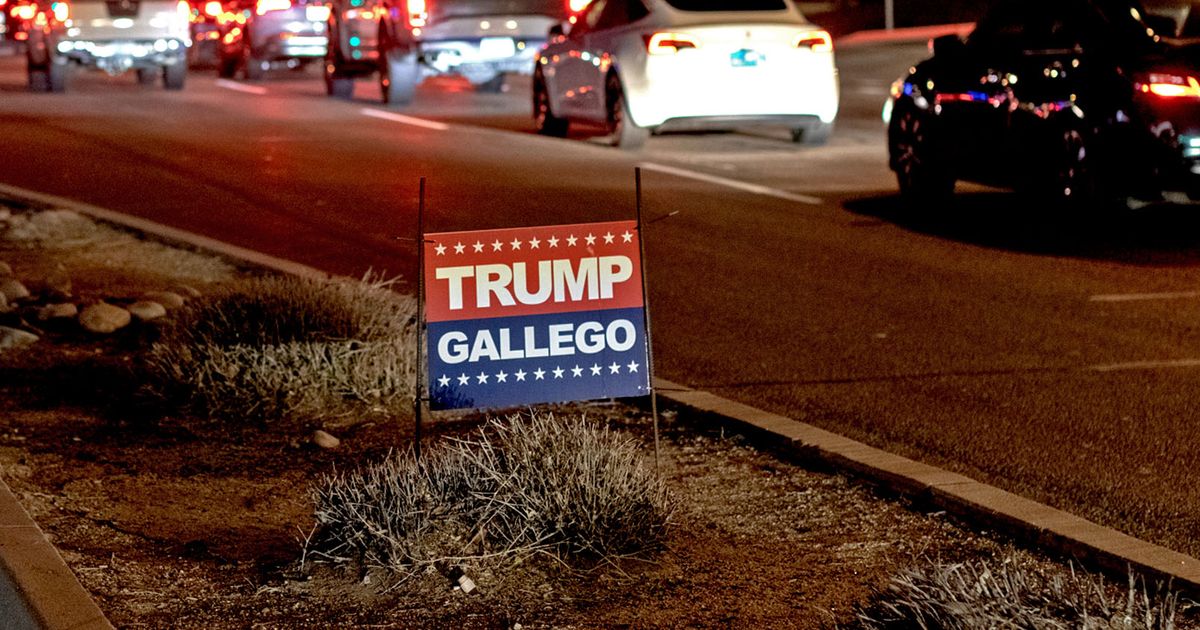Not once but twice during her confirmation hearing before the Senate Judiciary Committee, attorney general nominee Pam Bondi interrupted a Republican questioning her to emphasize Donald Trump’s margin of victory last November. When Sen. Ted Cruz noted that Trump won the election, Bondi added, “By 77.3% — 77.3 million Americans.” Later, Sen. Mike Crapo, R-Idaho, mentioned that Trump won, and Bondi piped up to say “312 electoral votes, senator,” to which he replied, “A landslide.”
It was a reminder that even Trump’s choices for the most ostensibly nonpartisan Cabinet positions act like cultists eager to massage Trump’s tender ego. But the Republicans’ reminders of Trump’s victory obscures an important weakness and Democrats should be paying close attention.
Republicans are more desperate than ever to convince the public that Trump is hugely popular — and that opposing him and his policies will be politically disastrous for Democrats. Nothing could be further from the truth. Trump was a historically unpopular president the first time around, and so far it looks as though he’ll face the same widespread public opposition in his second term.
Exaggerating the size of a president’s victory is not new. After George W. Bush won re-election in 2004, for instance, he bragged about spending his new “political capital.” But this time, the scale of the hyperbole is classically Trumpian. As much as Republicans want to throw around words such as “landslide” and “mandate,” 2024 was one of the closest elections in American history. Trump beat Vice President Kamala Harris in the popular vote by less than 1.5%; only one election in the last half-century (in 2000) was closer. And the razor-thin margins by which Republicans control both the House and the Senate testify to how closely the electorate is divided.
Still, most new presidents typically enjoy a honeymoon period: Fresh from their election victory, the public invests them with hopes for positive change and gives them the benefit of the doubt. Joe Biden, for instance, had 57% approval in the first Gallup poll of his presidency; Barack Obama came in at 67% approval. Even Bush, who like Trump lost the popular vote in his first victory, started at 57%. In fact, Trump was the only president in the Gallup poll’s history — going all the way back to Harry Truman — who entered office with an approval rating under 50%. He was also the only one to never crack 50% approval for a single day of an entire term.
On the verge of his second term, even after his first popular vote victory in three tries, Trump’s approval is weak. A new Marist/NPR poll puts it at just 44%; 49% say they disapprove of him. The Economist/YouGov poll gives him a similar 45/51 split, while a USA Today/Suffolk University survey has his favorability/unfavorability at 47% each.
The reasons Trump remains unpopular are, at this point in his career, both obvious to anyone and unlikely to change. No wonder then, that Republicans are so eager to inflate the size of Trump’s victory: it’s their best hope that Democrats will be scared away from being too full-throated in their opposition to Trump’s nominees and policy agenda.
Unfortunately, it has never been too hard to scare Democrats, many of whom always worry that a misplaced word or insufficiently focus-grouped proposal will doom them to defeat. And it sometimes appears that they are fooled by his incessant bragging and the intensity of his supporters’ devotion into thinking those supporters are more numerous than they are.
Since the election, too many Democrats have been shaky in their opposition. Some of them have granted the legitimacy of Elon Musk’s absurd effort to slash government, saying they look forward to working with him. Dozens of House and Senate Democrats joined with Republicans to pass the Laken Riley Act, an anti-immigrant measure that will put troubling powers in the hands of reckless red-state officials. Sen. John Fetterman even went to Mar-a-Lago to hang out with Trump and signal his openness to working together.
Democrats who are feeling fearful should take a cue from Republicans, who like Trump believe in a kind of fake-it-till-you-make-it approach to politics: Act as though everyone loves you and can’t wait for you to implement your agenda, and victory might just follow. The opposition version of this strategy is much more realistic: Assume that the public is, if not outright opposed to the president and what he does, at least skeptical enough to hear arguments about why it should be mad at the White House. Then act accordingly.
Even the best presidential honeymoons — which Trump is unlikely to get — are short-lived. Before long the public starts blaming the president for everything that goes wrong; there’s a reason almost every president’s party suffers defeats in midterm elections.
But not all voters are that attentive, so they need the opposition party to tell them everything the president is screwing up and why his administration is dragging the country to disaster. On this score, Trump and his administration will offer no shortage of material. When Trump takes the oath of office, Democrats need to treat him as a weak and reviled executive. And from then on, they should never let up the pressure.
This article was originally published on MSNBC.com














